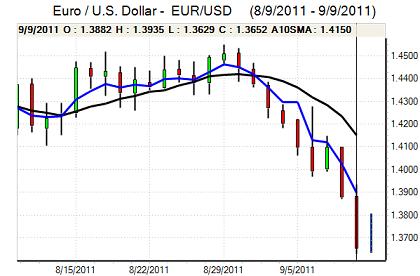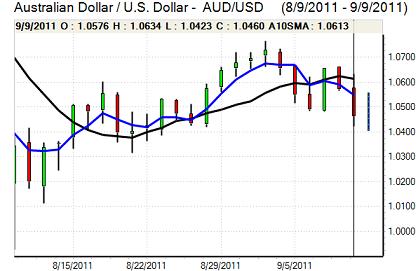EUR/USD
The Euro was subjected to further heavy selling pressure on Friday as technical and fundamental factors combined to seriously undermine confidence. After a relatively calm start, volatility sparked higher at the start of the US open as the Euro fell sharply to 7-month lows.
There was further downward pressure on European equity markets which undermined sentiment as fears over deteriorating economic conditions persisted. There were further rumours surrounding the Greek situation as speculation over a hard debt default and Euro exit persisted.
The Greek government expressed confidence in the private-sector bond-swap programme as the Friday deadline closed, but it suggested that participation rates would not be published for at least a week. There were also reports that the German government was drawing up contingency plans to support the domestic banking sector in the event of a Greek default. Greek officials strongly denied that there would be a default or Euro exit.
Euro confidence was then severely undermined by the announcement of ECB Chief Economist Stark’s resignation. Officially on personal grounds, Stark indicated that he had serious difficulties with the ECB bond-buying programme. The departure of the Bundesbank head and ECB Chief Economist within a few months over Euro issues is extremely serious negative factor for the currency. The Euribor-OIS spread rose to the highest level for 30 month, indicating that there were important stresses within the financial sector.
The G7 members met in Marseille and promised to support the economic recovery and provide sufficient liquidity, but there were further signs of divisions within members as there was explicit criticism of Europe from US and Canadian officials.
In this environment, the Euro weakened to seven month lows near 1.3650 while the weekly drop was the highest since July 2010. With no decisive moves by G7 and fear increasing, the Euro dipped to test lows near 1.3550 in Asia on Monday before a fragile correction with expectations of credit rating downgrades for European banks.

Source: VantagePoint Intermarket Analysis Software
Call now and you will be provided with FREE recent forecasts
that are up to 86% accurate * 800-732-5407
If you would rather have the recent forecasts sent to you, please go here
Yen
The dollar briefly pushed above the 77.80 level against the yen on Friday, but was blocked by exporter selling. There was another very sharp dollar decline during the US session with a brief decline to the 77.10 level as risk aversion increased before it recovered back to the 77.50 area.
The Euro retreated sharply to lows below 106. The deterioration in Euro confidence triggered renewed defensive demand for the yen and it briefly tested 10-year lows in Asia on Monday.
The Euro tended to dominate the New York session which tended to lessen the focus on the yen. There was still some speculation that there would be some concerted action to prevent fresh Japanese currency appreciation. The latest Bank of Japan minutes indicated increased fears that production would be shifted overseas due to the strong yen.
Sterling
Sterling was unable to break above the 1.60 level against the dollar on Friday and there were sharp losses on a break of technical support near 1.5950. Later in the US session, there were losses to fresh 7-week lows near 1.5850, in line with sharp dollar gains. In this context, the UK currency strengthened to highs close beyond 0.86 against the Euro on Monday.
The latest producer-price data recorded a 1.9% decline in input prices for August which may have some impact in curbing inflation, but growth indicators are liable to dominate in the short term. There will be further fears surrounding the economy which will tend to undermine Sterling support.
The banking sector will be an important focus and any evidence of increased stresses within the UK banks would have a negative impact on Sterling. There will, however, be support from the UK position outside the Euro-zone and volatility could be a key feature.
Swiss franc
The dollar maintained a strong tone against the franc on Friday and there was a peak above the 0.8850 level, the strongest level since early May. The Euro was unable to extend the advance against the franc and weakened back to the 1.2060 area.
A further intensification of the Euro-zone stresses will maintain the possibility of capital flows into Switzerland. The National Bank will, however, continue to block franc gains in the short term. The central bank commitment to prevent franc gains is likely to continue in the short term as it would be a severe loss of credibility as well as leading to heavy financial losses if the policy was reversed now.

Source: VantagePoint Intermarket Analysis Software
Call now and you will be provided with FREE recent forecasts
that are up to 86% accurate * 800-732-5407
If you would rather have the recent forecasts sent to you, please go here
Australian dollar
The Australian dollar initially held support above 1.06 against the US dollar on Friday, but was subjected to heavy selling pressure during New York. There were widespread US currency gains and the Australian dollar was also undermined by a serious deterioration in risk appetite.
The Euro-zone fears increased unease over the global growth outlook and this was important in curbing Australian demand as industrial commodity prices came under heavy selling pressure and there were lows below 1.04 in Asia on Monday with a slightly lower than expected trade surplus not having a major market impact.



